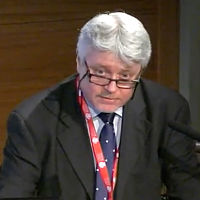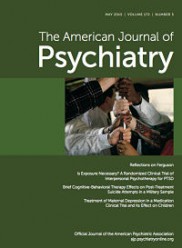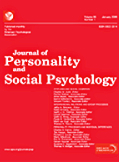Indexes - all Resources

Six key leadership traits Pope Francis and Donald Trump share. (2015)
“…leadership experts predictably surfaced dozens of differences between Francis and Trump. But they also brought up a surprising number of similarities Leigh Buchanan, Editor-at-large Inc Magazine 25 Sept 2015 Image: Getty Images "F. Scott Fitzgerald defined high intelligence as the ability to hold two opposed ideas in one's mind and still function. By that measure, an American population in love with both Pope Francis and...
Written by: Buchanan, L.
Read moreAntisocial personality disorder and pathological narcissism in prolonged conflicts and wars of the 21st Century. (2016)
“…once in power, a leader with an Antisocial Personality Disorder (ASPD) thrives on continuing conflict and never seeks peace." Frederick M. Burkle, Jr, MD, MPH, DTM, FAAP, FACEP. Harvard Humanitarian Initiative, Harvard School of Public Health; Senior International Public Policy Scholar, Woodrow Wilson International Center for Scholars, Washington, DC; National Academy of Medicine, Washington, DC. Disaster Medicine and Publ...
Written by: Burkle, Frederick M.
Read moreFighting corporate hubris: The four steps of the perpetuity principle. (2013)
CEOs should serve as stewards of their companies, developing profitable, sustainable, and trusted businesses. Hans-Paul Burkner, Chairman, Boston Consulting Group bcg.perspectives 6 June 2013. “Massive corporate fraud, the dot-com bubble, the worst economic crisis since the 1930s - these events have undermined many companies and leaders over the past 15 years. As CEOs begin to absorb the lessons of this turbulent perio...
Written by: Burkner, Hans-Paul
Read morePower, Gender, Hubris conference video 3/5: Professor Douglas Cairns. Hubris in classical myth and morality. (2017)
Professor Douglas Cairns, University of Edinburgh, discusses the classical definition of Hubris. He describes how it was defined by the great classical thinkers, in relation to temperament and law, and how it relates to modern morals. From the conference ‘Power, gender and hubris: success and arrogance as risks to leadership in health care and beyond' Held at the Royal Society of Medicine in London on 9 May 2017. Watch the vid...
Written by: Cairns, D.
ViewUnderstanding level 5 leaders: the ethical perspectives of leadership humility. (2017)
“Leaders can be more effective if they understand the ethical nature of leadership and the importance of humility in building trust.” Cam Caldwell, Riki Ichiho, Verl Anderson: Dixie State University, Utah Journal of Management Development, 36(5)
From the Abstract:“Jim Collins, in his seminal work Good to Great, noted that all great organizations are led by “Leve...
Written by: Caldwell, C., Ichiho, R., & Anderson, V.
Read moreNarcissistic Personality Disorder: Diagnostic and clinical challenges. 2015
“NPD sufferers may be grandiose or self-loathing; extroverted or socially isolated; captains of industry or unable to maintain steady employment; model citizens or prone to antisocial activities. Eve Caligor, M.D., Kenneth N. Levy, Ph.D., Frank E. Yeomans, M.D., Ph.D. From the Department of Psychiatry, Columbia University College of Physicians and Surgeons, New York; the Department of Psychology, Pennsylvania State University,...
Written by: Caligor, Eva at al.
Read moreTestosterone makes men less likely to question their impulses. (2017)
... testosterone either inhibits the process of mentally checking your work or increases the intuitive feeling that 'I'm definitely right.' Emily Velasco (staff writer) Previewing work by researchers including Prof. Colin Camerer, CalTech. Caltech, 27 April 2017 A new study has demonstrated a “clear and robust causal effect of [testosterone] on human cognition and decision-making. Researchers - from Calt...
Written by: Camera, C.
Read moreEarly lessons from Wells Fargo: Three ways to prevent getting set up for ethical failure. (2016)
"...Corporate scandals (and) ethical failures are often organizational at their outset." Ron Carucci forbes.com, 13 Sept 2016 Photo by Joe Raedle/Getty Images "While most assume corporate scandals are the result of devious, greedy people prone to do “bad” things, the reality is that ethical failures are often organizational at their outset. They frequently begin with otherwise good leaders being put into ...
Written by: Carucci, Ron.
Read moreDivide and conquer: When and why leaders undermine the cohesive fabric of their group. (2014)
"..leaders sometimes sabotage their own teams to protect their own power. Charleen R Case, Northwestern University. Evanston, Ill, Jon K. Maner, Kellogg Schoool of Management, Northwestern University. Evanston Ill, Journal of Personality and Social Psychology Vol 107(6), Dec 2014, 1033-1050. It’s assumed that leaders work to enhance positive social bonds among group members to facilitate cooperation and ...
Written by: Case, Charleen R. & Maner, Jon K.
Read moreThe dark side of resilience. (2017)
"… while it may be reassuring (to have resilient leaders) — such leaders are not necessarily good for the group, much like bacteria or parasites are much more problematic when they are more resistant." Tomas Chamorro-Premuzic, Hogan Assessments CEO and professor at University College London and Columbia University. Derek Lusk, Ph.D., business psychologist and member of the Global Alliances practice at Hogan Assessment Systems...
Written by: Chamorro-Premuzic, T., & Derek Lusk, D.
Read more













